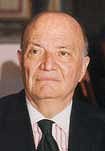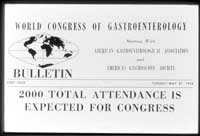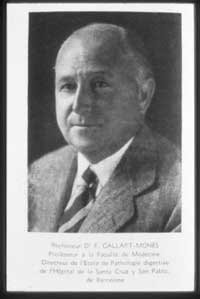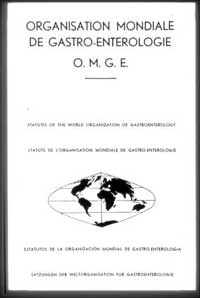

Due to the wonderful initiative of the WGO Secretary General, Professor Henry Cohen, we are commemorating the 45th Anniversary of the creation of the World Gastroenterology Organisation (WGO) on May 29th, 1958. From now on, the date of May 29th will be known as the "World Digestive Health Day."
Judging from the fact that each issue of "World Gastroenterology News" consists of almost 50,000 copies, we can surmise that there are today at least as many gastroenterologists around the world who will celebrate with us the World Digestive Health Day!
On the 29th of May 1958, the last day of the First World Congress of Gastroenterology which took place in Washington, an assembly of distinguished gastroenterologists announced the foundation of the WGO was born!
The group included, among others, Henry L. Bockus, President of the Congress, Albert Froehlich, Secretary of S.I.G.E., Thomas Hunt, President of the 1956 London International Congress, Francisco Gallart Monés, the last President of S.I.G.E. and René A. Gutmann, then President of A.S.N.E.M.G.E. Between May 25 and 29, 1958, they met daily to discuss the creation of a World Society of Gastroenterology. The participants unanimously agreed to appoint a provisional Governing Council of the Society which would convene further Congresses, organize activities compatible with the aims of a World Organisation and draft appropriate Statutes which would be submitted to a General Assembly of the existing National Societies. This epoch-making event was the end result of a series of conferences and discussions among the leaders of medical and surgical gastroenterology which had been going on for many years for the purpose of creating a truly international forum for gastroenterologists.
In fact, gastroenterology as a specialty, had emerged at the end of the Nineteenth Century when clinicians were stimulated to study the gastrointestinal tract thanks to the work of great physiologists such as Claude Bernard in France, Beaumont in the United States, Pavlov in Russia and Bayliss and Starling in the U.K. Great clinicians such as Ewald, Kussmaul, Leube, Dieulafoy, Trousseau, Brinton, Abercrombie, etc began to devise tools for the investigation of the digestive system, such as tubes for sampling gastric contents and endoscopic instruments to visualize the upper and the lower gastrointestinal tract. At the same time, great surgical personalities made possible the definitive treatment of digestive disease: the names of Billroth, Péan, Kocher, Hartmann and Mikulicz have been honoured through the years and were at the basis of the medico-surgical collaboration which has had such an impact in our ever growing specialty. The discovery of x-rays by Roentgen represented extraordinary progress which was rapidly put to use in all countries. The first efforts to conduct upper endoscopy by Kussmaul and Mikulicz as well as the examination of the lower bowel with instruments devised in America by Kelly, Beach, Tuttle and others, also defined the field of gastrointestinal disease. Endoscopy as such began its fruitful endeavours in the last quarter of the Nineteenth Century although its advance was probably hindered by the wide use of radiological techniques.

There were internists dealing specifically with digestive diseases (gastroenterology and/or hepatology) in Germany, Austria, France, the United States, Japan and to a lesser extent in Scandinavia, the Netherlands, Belgium, Italy and Spain. Gastroenterologists started to travel: North Americans, where the specialty had rapidly risen, visited Berlin, London and Vienna, while South American physicians went mostly to Paris, Lyon and other French cities. Spaniards and Italians went to Paris, Vienna and Berlin. Contacts rapidly developed between colleagues from the two Continents as can be easily ascertained by reading the same bibliographic references on papers published on both sides of the Ocean. Moreover, around 1930, American gastroenterology was strengthened by important contributions from German physicians who had left their country at the advent of nazism.
The first gastroenterologists started soon to organize specialized services, associations, journals and conferences on diseases of the digestive tract. The first structured gastroenterology society to see the light was the American Gastroenterological Association (A.G.A.) founded in 1897. The Japanese Society followed in 1902. In Europe apparently the Polish Society was the first to be officially created in 1907. However an important journal entirely devoted to digestive diseases had appeared earlier: the German "Archiv für Verdauungskrankheiten" which started in 1895 and rapidly became the leading journal in the specialty. The French "Societé Nationale de Gastroentérologie de Paris" originated in 1909 with the publication of the "Archives Français des Maladies de l'Appareil Digestif". The Nederlands Society was born in 1913. The first society to be founded in South America was the "Sociedad Argentina de Gastroenterología" dating from 1922.

Scientific exchanges and national meetings that were often attended by foreigners, prepared the way for international meetings dedicated to the presentation and the discussion of the new advances in the specialty. The origins of international gastroenterology are closely linked to the personality of Georges Brohée, a surgeon and radiologist from Brussels (1887-1957) a man of great energy who enthusiastically began to contact gastroenterologists from Belgium, France, Netherlands, the UK and other European countries. According to Ludovic Standaert who has written an excellent story of early European gastroenterology, he founded the Belgian Society of Gastroenterology and a journal "Acta Gastroenterologica Belgica" which he considered essential for the international diffusion of the specialty. In 1935, Brohée organized the first International Congress of Gastroenterology in Brussels (8-11 August 1935). In attendance were the presidents of 10 national societies of gastroenterology and almost 600 delegates from 35 countries. Official languages were French, German and English.
Brohée then founded an International Society of Gastroenterology (S.I.G.E.). Actually, the WGO was a continuation of the Society founded by Brohée; however, there were major differences between the S.I.G.E. and the WGO: the Societé Internationale de Gastroentérologie was based on individual membership, a feature that obviously did not favour its growth, while WGO started as a federation of National Societies of Gastroenterology, in which the members were the National Societies themselves.
This was not an innovation, as there were previous examples of gastroenterology federations: The decision to organize WGO along the lines of a federation followed the creation, again by Georges Brohée, of the European Association of Gastroenterology Societies, the A.S.N.E.M.G.E. officially constituted in 1947 with the main purpose of organizing a periodical European Congress and a Panamerican Federation which followed suit in 1948, under the name of A.I.G.E., and first presided over by Dr. Bonorino Udaondo, a distinguished gastroenterologist from Buenos Aires. Both federations, A.S.N.E.M.G.E. and A.I.G.E. paved the way for the establishment of a World Organization.
The unfolding of the entire process had taken more than fifty years: the First International Congress in Brussels was followed by other meetings: there was a second S.I.G.E. congress in Paris (1937) and after World War Two, European congresses resumed in Lausanne (1948), in Madrid (1950), in Bologna-Montecatini (1952), in Paris in 1954 and in London in 1956. The London congress was a large meeting presided over by Dr. Thomas Hunt and attended by many American gastroenterologists. There, following previous reunions among leading specialists from Europe, the United States and South America the decision was taken to organize a World Congress in 1958. Washington, the United States capital, was chosen for the event as it was felt that the oldest and most powerful national society of gastroenterology, the American Gastroenterological Association, would be able to organize such a Congress with adequate financial backing and manpower support. Dr. Henry L.Bockus, a leading American gastroenterologist from Philadelphia who had acquired a well deserved reputation because of the authorship of an outstanding Gastroenterology treatise and the organization of postgraduate courses in our specialty at the University of Pennsylvania, that were attended by numerous physicians from North and South America as well as from Europe, was elected President of the event. The Congress was a highly successful affair based on a considerable number of innovations differing from the format of the previous international congresses. There were no longer two or three subjects to be discussed by a group of appointed specialists, but instead free papers, panel discussions and reviews stressing the diversity in epidemiology and natural history of digestive diseases around the World were given priority.
On the last day of the Congress a provisional WGO Governing Council was elected. It consisted of Henry L.Bockus (USA) as President, Albert Froehlich (Belgium) as Secretary General (who was the Secretary of the S.I.G.E.), Norbert Henning (Germany) who had been elected chairman of the Second World Congress to be held in Munich in 1962, Laureano Falla (Cuba) President of the Interamerican Association of Gastroenterology (A.I.G.E.), Geraldo Siffert (Brazil) Secretary General of A.I.G.E., A.J. Haex (Netherlands), President of the European and Mediterranean Association of Gastroenterology Societies (A.S.N.E.M.G.E.), Marvin Pollard (U.S.A.) Secretary General of the Washington Congress, Thomas Hunt (U.K.) who presided over the 1956 Congress of the S.I.G.E. in London where preparations for the World Congress were started, Joel Valencia-Parparcén, (Venezuela) President of the 1958 Panamerican Congress of Gastroenterology which took place in Caracas and Clifford Barborka (U.S.A.), president of the American Gastroenterological Association and "pro tem" President of the future O.M.G.E. Research Committee.
The group appointed a commission that would draft the WGO Statutes which were to be adopted by a General Assembly of all Societies in Munich in 1962. This first General Assembly of WGO was held there after a preparatory session that took place on the 19th April 1960 in Leiden during the A.S.N.E.M.G.E. Congress.
In Washington it was decided that the official name of the world society should be "Organisation Mondiale de Gastroenterogie", (O.M.G.E.), thus honouring the French speaking founder of the first international congress and of the first international society, Dr. Georges Brohée. However, English and Spanish became also official languages of the new Organisation.
As Dr.Bockus stated in his first message as WGO president, which was published in the Proceedings of the First World Congress, "WGO should play an important role in the design and the direction of research projects in the broad field of gastroenterology and nutrition and particularly in differences in epidemiology and behaviour patterns of disease in various parts of the World".
A Committee on Research was appointed under the chairmanship of Clifford Barborka, who at that time was the president of the A.G.A. Another important function of WGO was to be the study and correlation of facilities for graduate medical education in gastroenterology throughout the world. A Committee on Education was also established under the chairmanship of Geraldo Siffert from Brazil. Dr. Bockus thought that communications were essential and therefore took the initiative of publishing WGO. bulletins. Three bulletins appeared in 1959, the first was edited by Dr. Froehlich and the others by Dr. Lester Pope who had been appointed executive officer of WGO. Since that time, bulletins have appeared regularly although under different names. Today they are published as "World Gastroenterology News".
Publishing a Bulletin and appointing an executive officer obviously required funds. The problem that faced the founders of WGO was not a new one for many scientific societies: there could be no funds whatsoever available for their venture until an adequate structure was achieved which would allow the collection of fees from national societies, (although many of these faced similar problems in their own countries!). WGO survived thanks to donations from the British Society of Gastroenterology, the American Gastroenterological Association and from Dr. Kawashima from Japan who in 1966 would preside over the Third World Congress of Gastroenterology in Tokyo.
There were also earnest discussions among the founding members with regard to the future aims of the WGO. Some viewed it as a mere enlargement of the S.I.G.E. the main task of which was the periodic organization of international congresses of gastroenterology. Others, including Dr. Bockus, thought that WGO should constitute a unique facility not only for exchanging information but also for encouraging much needed research particularly in the epidemiology and the natural history of digestive diseases which varied so much from one part of the world to the other, and also for fostering the implementation of registries of gastroenterology educational centres as well as guidelines for the training of gastroenterologists that could be accepted world-wide. This would require the creation of research and education committees, which continue to be the main strength of our organization.
The first article of the provisional draft of the WGO Statutes proposed by the S.I.G.E. Board stated that : "The purpose of the World Organization is to contribute on global scale to the study of and progress in Gastroenterology more particularly by organizing and holding a World Congress of Gastroenterology at regular times". This was just a slight modification of the S.I.G.E. Statutes, and was plainly unsatisfactory for Dr. Bockus and others. The Statures finally approved in 1963 by the General Assembly in Munich at the end of the Second World Congress, reflected the views of the new Governing Board and had been amended as follows:

The Statutes have been modified many times since the approval of the first ones in 1963, but the aims of WGO., as stated there, remain essentially the same, and I believe that we can proudly look back at what has been achieved in the fields of international research, education, training, ethics, and the practice of gastroenterology as well in encouraging and helping in the creation of new Continental Associations.
Thanks to the wonderful initiative of the WGO. Secretary General, Professor Henry Cohen, from now on, the date of May 29th will be known as the World Digestive Health Day.
Judging from the fact that each issue of "World Gastroenterology News" consists of almost 50,000 copies, we can surmise that there are today at least as many gastroenterologists around the World who will celebrate with us World Digestive Health Day!